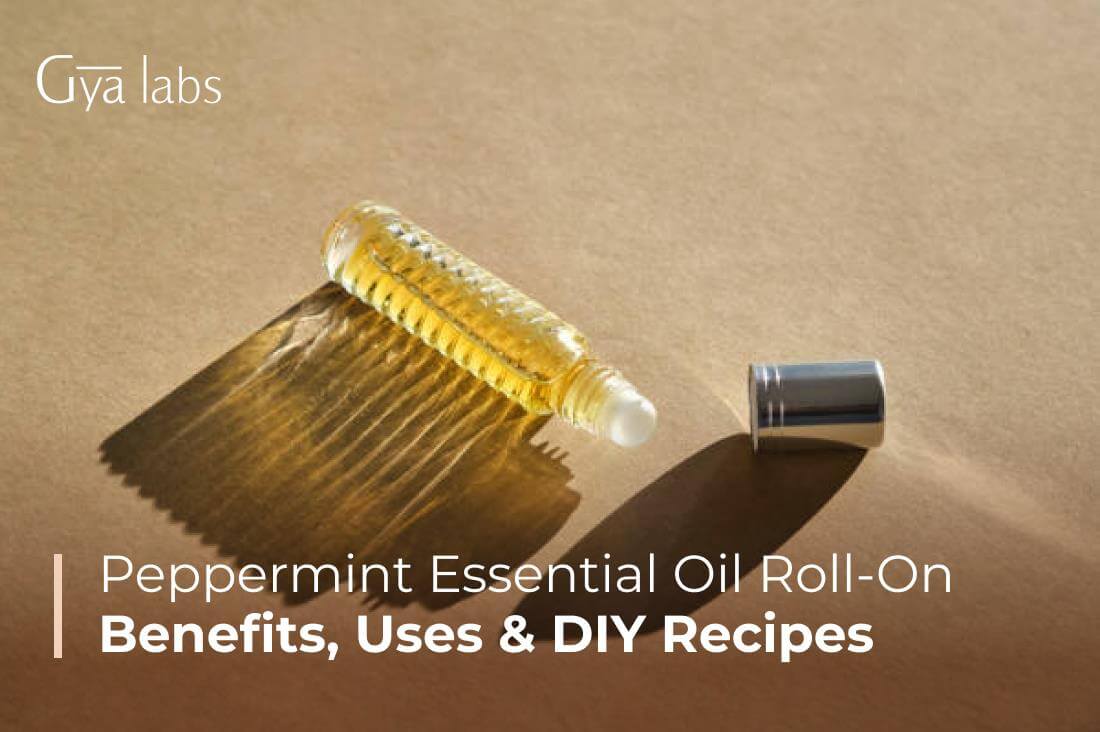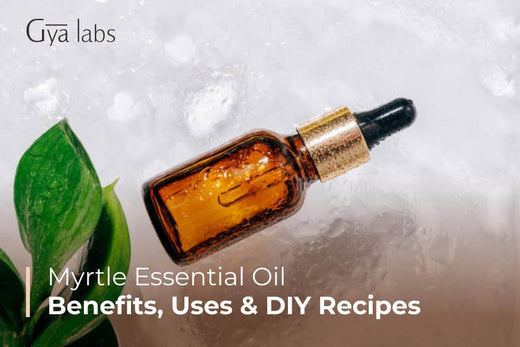Overview
In the realm of holistic wellness, cistus essential oil, also known as rock rose, stands out as a botanical powerhouse with an array of incredible benefits. Extracted from the leaves of the cistus plant through a meticulous process of steam distillation, this essential oil has been cherished for centuries for its aromatic richness and therapeutic properties. Cistus essential oil has a sweet, floral scent that is similar to rose.
The botanical name of cistus plant is Cistus ladaniferus which is commonly referred to as Labdanum or rockrose or rose of Sharon is an evergreen shrub that thrives in Mediterranean regions and yields the precious leaves from which the essential oil is extracted. There are about 20 species of cistus that are native to Mediterranean region, but only few are suitable for therapeutic purposes.
In this article, we are going to discuss uses and benefits of cistus essential oil. Also, some DIY recipes have been suggested in the end to incorporate cistus oil in daily routine.
Constituents of Cistus Essential Oil
The complexity of cistus essential oil's fragrance and therapeutic properties lies in its intricate blend of constituents. Here are some key components that contribute to the oil's aromatic richness and potential health benefits:
-
Labdanum: Labdanum, also known as rockrose, is a primary constituent that imparts a distinctive fragrance to cistus essential oil. This aromatic compound is often associated with calming and grounding effects, making it a valuable element in aromatherapy.
-
Terpenes: Cistus essential oil contains various terpenes, including pinene and carene. These compounds contribute to the oil's anti-inflammatory and antiseptic properties, making it beneficial for both skin and respiratory health.
-
Phenols: Phenolic compounds, such as eugenol, can be found in cistus essential oil. These constituents contribute to the oil's antioxidant properties, potentially supporting overall health and well-being.
-
Monoterpenes: Monoterpenes like limonene are present in cistus essential oil, offering additional aromatic complexity and potential therapeutic effects. Limonene, in particular, is known for its uplifting and mood-enhancing qualities.
Health Benefits Of Cistus Essential Oil
1. Respiratory Support
Cistus essential oil emerges as a promising ally in promoting respiratory health. When diffused, its aromatic molecules disperse into the air, creating an atmosphere that is believed to offer relief from respiratory issues such as bronchitis and cough. The inhalation of cistus essential oil may help soothe irritated airways and ease breathing, contributing to a sense of respiratory well-being.
2. Anti-Inflammatory Properties
One of the notable attributes of cistus essential oil lies in its anti-inflammatory properties. These properties make the oil a potential remedy for alleviating symptoms associated with colds and respiratory discomfort. The anti-inflammatory action may assist in reducing inflammation in the respiratory tract, providing relief from congestion and promoting a more comfortable breathing experience.
3. Antioxidant Properties
Cistus essential oil is believed to have antioxidant properties. Antioxidants play a crucial role in neutralizing harmful free radicals in the body. By possessing antioxidant capabilities, cistus essential oil contributes to the overall health and well-being of individuals. The therapeutic grade designation underscores the oil's efficacy in supporting the body's natural defense mechanisms and promoting a state of holistic health.
Cistus Essential Oil Benefits For Skin
1. Antibacterial and Antiviral Properties
Cistus essential oil boasts potent antibacterial and antiviral properties, making it a valuable asset in addressing various skin concerns. These properties indicate the oil's ability to combat harmful bacteria and viruses, offering a natural solution for conditions such as psoriasis, eczema, and wounds. By incorporating cistus essential oil into skincare routines, individuals may harness its antimicrobial prowess to promote skin health and expedite the healing process.
2. Suitable for Sensitive Skin
Notably, cistus essential oil is well-suited for individuals with sensitive skin. Its natural composition and gentle yet effective properties make it an ideal choice for those with delicate skin types. Beyond addressing specific skin concerns, cistus essential oil provides a soothing and aromatic solution for mature skin, catering to the unique needs of sensitive skin while contributing to the overall healing and rejuvenation of the skin's surface.
3. Fragrance for Skincare
In addition to its therapeutic properties, cistus essential oil introduces a delightful fragrance to skincare routines. The aromatic notes of the oil enhance the overall sensory experience, turning skincare into a pleasurable and indulgent ritual. The fragrant quality of cistus essential oil adds an olfactory dimension to the skincare routine, making it a sensory journey that not only nurtures the skin but also elevates the overall well-being of the individual.
Hair Benefits Of Cistus Oil
1. Healthy Scalp
Incorporating cistus essential oil into your hair care routine can contribute to maintaining a healthy scalp. Adding a few drops of this oil to a carrier oil of your choice provides a nourishing blend that can be massaged into the scalp. Cistus essential oil's natural properties may help balance the scalp's moisture, soothe irritation, and create an environment conducive to overall scalp health. By fostering a healthy scalp, individuals may promote optimal conditions for hair growth and vitality.
2. Protection Against Dandruff
Cistus essential oil's inherent properties extend to offering protection against common hair issues, including dandruff. Regular application of cistus essential oil, either diluted in a carrier oil or added to your favorite hair products, may assist in maintaining a flake-free scalp. Its potential antibacterial and antiviral attributes contribute to a healthier scalp environment, reducing the likelihood of dandruff formation and promoting an overall state of hair wellness.
3. Herbaceous Aroma
Beyond its practical benefits, cistus essential oil brings a distinctive herbaceous aroma to your hair care routine. This aromatic quality not only enhances the overall sensory experience but also contributes to a refreshing and invigorating atmosphere. The pleasing fragrance of cistus essential oil can linger on the hair, providing a subtle and natural scent that adds an extra layer of enjoyment to your daily hair care rituals.
Different Ways To Use Cistus Essential Oil
1. Aromatherapy Bliss
Transform your space into a haven of tranquility by using cistus essential oil in a diffuser. The herbaceous aroma, enriched with the constituents of labdanum, creates an inviting atmosphere. This not only supports respiratory health, addressing concerns like bronchitis and cough, but also enhances meditation and relaxation.
2. Skincare Elixir
For radiant and healthy skin, add a few drops of cistus essential oil to your favorite carrier oil. This blend becomes a natural powerhouse for addressing various skin concerns, from psoriasis to wounds. Suitable for sensitive skin, it offers antibacterial and antiviral properties, promoting skin health and contributing to wound healing.
3. Hair Revitalization
Nurture your scalp by adding a few drops of cistus essential oil to your regular hair care routine. Mixed with a carrier oil, it contributes to a healthy scalp environment, potentially preventing issues like dandruff. Beyond practical benefits, the herbaceous aroma of cistus essential oil lends a delightful fragrance to your hair, elevating the sensory experience.
4. Therapeutic Touch
Experience the therapeutic grade of cistus essential oil by adding it to your massage oil. The anti-inflammatory properties can soothe muscles, while the aromatic notes enhance the overall massage experience. Whether for relaxation or targeting specific areas, cistus essential oil adds a holistic touch to your massage sessions.
5. Daily Diffusion Ritual
Integrate cistus essential oil into your daily routine by diffusing it in the morning. This not only sets a calming tone for the day but also supports respiratory health. Consider blending it with other essential oils to create personalized aromatic blends for various occasions.
6. Cistus-infused Skincare Products
Enhance your existing skincare products by adding a drop or two of cistus essential oil. This allows you to tailor your skincare routine to your specific needs, infusing it with the antibacterial and antiviral benefits of cistus while enjoying its aromatic nuances.
7. Steamy Respiratory Relief
Experience respiratory relief by adding a few drops of cistus essential oil to a bowl of hot water. Inhale the steam to alleviate cold symptoms and soothe respiratory discomfort. This method is a quick and effective way to tap into the oil's therapeutic properties.
8. Scented Meditation
Elevate your meditation practice by incorporating cistus essential oil. Add a drop to your meditation space or use it in a diffuser to create a serene ambiance. The calming and grounding effects of the oil enhance the spiritual aspect of your meditation sessions.
9. Create Custom Blends
Explore the world of custom blends by combining cistus essential oil with other essential oils. Whether for perfumery, skincare, or specific therapeutic purposes, experimenting with different blends allows you to tailor your aromatic journey to your preferences.
DIY Recipes Using Cistus Essential Oil
Recipe #1 - Meditative Massage Oil Blend
Ingredients:
- 1 oz carrier oil (jojoba, almond, or coconut oil)
- 5 drops cistus essential oil
- 3 drops eucalyptus oil
- 2 drops citrus essential oil (orange or lemon)
Instructions:
- In a dark glass bottle, combine the carrier oil with cistus essential oil.
- Add the eucalyptus and citrus essential oils to the blend.
- Close the bottle and shake well to ensure thorough mixing.
How to Use:
Before your prayer and meditation sessions, apply a small amount of the blend to your palms. Gently massage onto your neck, temples, and pulse points. Inhale deeply and enter a state of calmness, allowing the aromatic notes to enhance your meditative experience.
Benefits:
- Cistus essential oil helps promotes a sense of tranquility, enhancing the meditative experience.
- The blend harnesses the constituents of cistus oil, known for their calming properties.
- Using this natural blend aligns with a holistic and natural living approach.
- Cistus essential oil has been used for centuries in meditation practices, and this blend continues that tradition.
Recipe #2 - Skin Soothing Sunburn Relief Spray
Ingredients:
- 2 oz aloe vera gel
- 10 drops cistus essential oil
- 5 drops lavender essential oil
- 3 drops eucalyptus oil
Instructions:
- Mix the aloe vera gel with cistus essential oil in a spray bottle.
- Add lavender and eucalyptus essential oils to the mixture.
- Shake well to ensure proper blending.
How to Use:
Spray the blend onto sunburned areas, allowing it to absorb into the skin. Reapply as needed for soothing relief.
Benefits:
- Antiseptic Properties: Cistus essential oil's antiseptic nature supports skin healing.
- Dilution: Aloe vera gel provides a gentle dilution for safe topical application.
- Astringent Effects: Cistus oil's astringent properties aid in soothing sunburned skin.
- Sensitization Precaution: Dilution with aloe vera minimizes the risk of skin sensitization.
Recipe #3 - Citrus-infused Facial Toner for Inflammatory Skin
Ingredients:
- 1/2 cup witch hazel
- 2 drops cistus essential oil
- 1 drop eucalyptus oil
- 1 drop citrus essential oil (grapefruit or bergamot)
Instructions:
- Combine witch hazel with cistus essential oil in a glass bottle.
- Add eucalyptus and citrus essential oils to the mixture.
- Shake well and let the toner sit for a few hours for optimal blending.
How to Use:
Apply the toner to your face using a cotton pad after cleansing. Use morning and night as part of your skincare routine.
Benefits:
- Inflammatory Skin Support: Cistus and eucalyptus oils offer anti-inflammatory properties for calming irritated skin.
- Used Topically: The toner allows for the topical application of cistus essential oil to promote skin health.
- Sun Exposure: Ideal for those exposed to the sun, providing a refreshing and soothing effect.
You can also customize these blends by using your favorite essential oils. Cistus oil blends well with many different essential oils. It blends well with frankincense, lavender, bergamot, geranium, clary sage, patchouli, rosemary, cedarwood, sandalwood oil, etc.
Risks And Precautions Of Using Cistus Essential Oil
While cistus essential oil offers numerous benefits for skin care and spiritual well-being, it's essential to be aware of potential risks and take necessary precautions to ensure safe usage. Here are important considerations:
1. Skin Irritation
- Risk: Cistus essential oil, when applied undiluted directly onto the skin, may cause irritation.
- Precaution: Always dilute cistus essential oil with a carrier oil before applying it to the skin. Conduct a patch test on a small area to check for any adverse reactions before broader application.
2. Undiluted Use
- Risk: Applying cistus essential oil undiluted may lead to skin sensitivity and irritation.
- Precaution: Dilution is crucial. Mix cistus oil with a suitable carrier oil, such as jojoba or coconut oil, before applying it to the skin. This ensures a safe and gentle application.
3. Additive Sensitivity
- Risk: Some individuals may be sensitive to additives in certain cistus essential oil products.
- Precaution: Check the ingredients list of the cistus essential oil product to ensure it is pure and free of additives. Opt for high-quality, reputable brands.
4. Spiritual Use
- Risk: Applying undiluted cistus essential oil in a spiritually significant context may cause skin irritation.
- Precaution: Dilute the oil even when using it for spiritual or meditative purposes. This ensures a pleasant experience without the risk of skin sensitivity.
5. Pregnancy and Medical Conditions
- Risk: Pregnant individuals and those with specific medical conditions may need to exercise caution.
- Precaution: Consult with a healthcare professional before using cistus essential oil, especially if pregnant, nursing, or dealing with medical conditions. Some oils may not be suitable for certain individuals.
6. Children and Pets
- Risk: Essential oils can be too potent for children and pets.
- Precaution: Keep cistus essential oil out of reach of children. Consult with a veterinarian before using essential oils around pets, as some oils can be harmful to them.
7. Avoid Ingestion
- Risk: Ingesting cistus essential oil can be harmful.
- Precaution: Cistus essential oil is intended for external use only. Never ingest it, and keep it away from the reach of children to prevent accidental ingestion.
8. Allergic Reactions
- Risk: Individuals with allergies may experience reactions to certain components in cistus essential oil.
- Precaution: Conduct a patch test before regular use, especially if prone to allergies. If any adverse reactions occur, discontinue use and seek medical advice.
9. Consultation
- Risk: Using cistus essential oil without proper consultation can lead to unintended consequences.
- Precaution: Before incorporating cistus essential oil into your routine, especially for therapeutic or medicinal purposes, consult with a healthcare professional or a qualified aromatherapist.
Conclusion
In conclusion, cistus essential oil, also known as rock rose, holds incredible potential for our well-being. With its unique properties, this oil has been used for centuries, proving its effectiveness in various applications. From skincare to respiratory support, cistus oil can help in many ways.
Remember, the shelf life of this oil is important, so store it properly in a cool, dark place to maintain its potency. Dilute the oil before use, as it can be potent. Whether you're seeking relaxation through meditation or relief from skin concerns, cistus essential oil can be a valuable addition to your daily routine.















